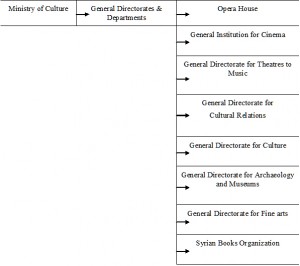Government
Organization of public administration (♥)
Ministry of Culture
The Ministry of Culture (MOC) is responsible for international cultural relations, copyright, cultural heritage, museums, book publications and literacy programmes, festivals, visual arts, film, performing arts, academic education in the arts.
The Directorate-General of Antiquities and Museums (DGAM) is the government agency that is responsible for the protection, promotion and excavation activities in all sites of national heritage in the country (for more on DGAM see Wikipedia and Facebook). The directorate was established after Syria’s independence in 1946 and has been under the central supervision of the Ministry of Culture ever since. According to Wikipedia the Directorate-General is split into several different direct directorates including:
- Directorate of Museum Affairs: Responsible for the management and development of all Syrian museums, in addition to supervising any foreign exhibition of Syrian artifacts.
- Directorate of Excavations and Archaeological Studies: Responsible for the managing, organizing and supervising excavation works inside Syria and cataloging any findings.
- Al-Basil Center for Archaeological Research and Training
- Directorate of Planning and Statistics
- Directorate of Historic Buildings
- Directorate of Administrating Historic Sites
The State Planning Commission (SPC) is responsible for issuing the documents which define the development and implementation of all policy plans, general and sectorial, of the different ministries, including the Ministry of Culture. The SPC is affiliated with the Council of Ministers and supports the Higher Council for Planning.(1)
Figure 1: Organization of the Ministry of Culture
Interministerial or intergovernmental and intersectoral cooperation
Certain aspects of cultural policy are dealt with by other ministries:
- the Ministry of Social Affairs and Labour is responsible for the work on Non-Governmental organizations (NGOs) and the approval of their cultural activities;
- the Ministry of Tourism supervises the Higher Council for Tourism, which is responsible for issuing investment laws for archaeological sites, and the Tourist Promotion Directorate, which organizes art exhibitions, issues laws on the acquisition of antiquities, promotes Syrian art and archaeological heritage through local festivals, and delegates popular arts groups and craftsmen for participation in international fairs and events;
- the Arabic Language Academy;
- the Ministry of Information supervises the General-Directorate of Radio and Television;
- the Ministry of Economy supervises the Chamber of Cinema Industry and the Fairs Ground;
- the Ministry of Defence runs the Military Theatre;
- the Ministry of Education administers school theatres, and curricular and extracurricular artistic activities;
- the Ministry of Higher Education supervises the Higher Council for Culture and Arts;
- the Ministry of Local Administration organizes the work of governorates and municipalities (2).
Each ministry has a statistics and planning directorate, which reports to the minister in question, but the SPC are involved in defining policies. Each ministry submit its plan for approval by the SPC, together with the investment (planning) budget and the running budget. ‘the annual plans must be approved by the Council of Ministers; the budget is confirmed after it has been ratified by Parliament.
The cooperation between ministries or governmental bodies in the cultural field is limited to signing short-term memoranda for the implementation of projects or activities. To implement such interministerial agreements, a joint committee is formed under the supervision of the legal departments of the ministries in question, and after the official signature of this partnership, another joint committee is assigned to coordinate the project. As a result of this poor consultation, proposed interministerial projects overlap and there is mutual interference in projects adopted by different ministries. For example, both the Ministry of Culture and the Ministry of Tourism are responsible for the coordination of the relations between the cultural and tourist sectors.
Cooperation between government tiers
The Ministry of Local Administration supervises the work of governorates and municipal councils. Each governorate has 2 administrative bodies: an executive office for cultural affairs, celebrations and festivals, which is a department within the municipalities, and a Directorate of Culture, which represents the Ministry of Culture. Cultural centres therefore have to deal with a double governance. On an administrative and financial level they are affiliated to the Ministry of Local Administration/ governorates (municipalities) and on a programming level to the Ministry of Culture.
The Directorates of Culture are located in all 14 Syrian governorates. The ministerial rules and the rules of their administrative representatives overlap which makes it difficult for the centres to operate efficiently.
Urban/regional dynamics
Under a joint initiative launched by the EU and the Syrian government, work began in 2005 on preparing the first experimental stage of the MAM (Municipal Administration Modernization) project in 6 cities. The MAM Project aims to decentralize decision-making, giving local authorities greater control over their affairs, and introducing administrative and financial changes.
Local communities are slowly becoming partners in the development of programmes and research, although communication channels between the cultural sector and local communities are still in their infancy. In recent years, the Ministry of Culture has extended the geographical range of its activities to the Northern region of Syria. Until then cultural activities were concentrated in the capital and a few large cities.
For more on
Notes
- The main legislation on the organization of the SPC is Decree No 86 (1968) and its amendments by virtue of Decree N’ 5 (2004).
- The Ministry was established on the basis of the Local Administration Law (1970).
[♥] From: Syria by Reem Al Khatib and Rana Yazaji published in ‘Cultural Policies in Algeria, Egypt, Jordan, Lebanon, Morocco, Palestine, Syria and Tunisia. An introduction’, Cultural Resource/European Cultural Foundation, Bookmanstudies, 2010, 177-181.

